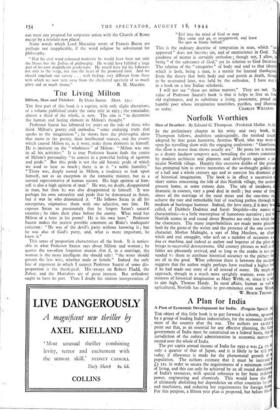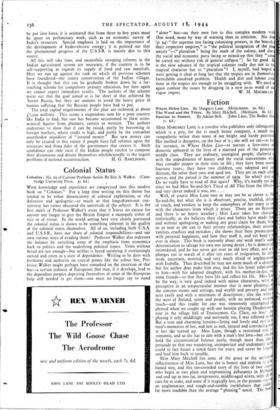A Plan for India
A Plan of Economic Development for India. (Penguin Special.. 01
THE object of this little book is to put forward a scheme, sponsord by. a group of leading Indian industrialists, for the economic develop ment of the country after the war. The authors are careful II point out that, as an essential for any effective planning, the futell government of India must be constituted on a federal basis, that rI,1 jurisdiction of the , central adthinistration in economic matters 0 extend over the whole of India.
The per capita annual income of India for 1931-2 was £4 iTh only a quarter of that of Japan, and it is likely to be still I today, if allowance is made for the phenomenal growth of population. The authors estimate that it must be. increased £5 its. in order to secure the requirements of a minimum s of living, and this can only be achieved by an all round develop of India's resources, with special reference to her basic indu power, engineering and chemicals. This' would have the of ultimately abolishing her dependence on other countries for and machinery, and reducing her requirements for foreign fi For this purpose, a fifteen year plan is proposed, but before thus
be put into force, it is estimated that from three to five years must be spent on preliminary work, such as an economic survey of India's resources. Special emphasis is laid on -the importance of the development of hydro-electric energy ; it is pointed out that the phenomenal progress of the U.S.S.R. is mainly due to this Source.
All this will take time, and meanwhile sweeping reforms in the Indian agricultural system are necessary, if the country is to be self-supporting as regards its supply of food and raw materials. Here we run up against the rock on which all previous schemes have foundered—the innate conservatism of the Indian villager. It is thought that this can be gradually broken down by a far- reaching scheme for compulsory primary education, but here again we cannot expect immediate results. The authors of the scheme point out that the goal aimed at is far short of that achieved by Soviet Russia, but they are anxious to avoid the heavy price in human suffering that the Russian people have had to pay.
The total capital requirements of the plan are reckoned at about £7,5oo millions. This seems a stupendous sum for a poor country like India to find, but one has become accustomed to these astro- nomical figures from planners, eastern or western. The authors endeavour to show that it can be raised, partly by borrowing in foreign markets, where credit is high, and partly by the someyvhat unorthodox expedient of " created money." But new money can only be created to this extent if people have full reliance upon the resources and bona fides of the government that creates it. Such confidence can only exist if the Indian people resolve to compose their dissensions and devote themselves wholeheartedly to the urgent
problems of national reconstruction. H. G. Rawutsrsom.























 Previous page
Previous page